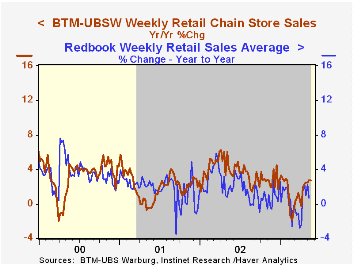 Global| May 20 2003
Global| May 20 2003Chain Store Sales Slipped Again
by:Tom Moeller
|in:Economy in Brief
Summary
Chain store sales slipped another 0.1% last week following a 0.2% dip the prior week, according to the BTM-UBSW survey. So far in May sales were 2.0% above the April average owing to a sharp 2.1% jump in the first week of the month. [...]

Chain store sales slipped another 0.1% last week following a 0.2% dip the prior week, according to the BTM-UBSW survey.
So far in May sales were 2.0% above the April average owing to a sharp 2.1% jump in the first week of the month.
During the last five years there has been a 60% correlation between the year-to-year percent change in chain store sales as tallied by BTM-UBSW and Redbook Instinet Research.
The BTM-UBSW retail chain-store sales index is constructed from the sales results reported by seven retailers: Dayton Hudson, Federated, Kmart, May, J.C. Penney, Sears and Wal-Mart.
| BTM-UBSW (SA, 1977=100) | 5/17/03 | 5/10/03 | Y/Y | 2002 | 2001 | 2000 |
|---|---|---|---|---|---|---|
| Total Weekly Retail Chain Store Sales | 416.5 | 416.9 | 2.7% | 3.6% | 2.1% | 3.4% |
by Tom Moeller May 20, 2003

The US Government ran a budget surplus last month as it usually does during the April tax collection season. However, this year's April surplus was the leanest since 1995, a year when the budget deficit ultimately totaled $164B.
Consensus expectations had been for an April surplus of $50.0B.
Through April the Federal government's deficit totaled $201.6B, more than double last year's deficit through the first seven months of the fiscal year.
Net receipts for the first seven months of FY03 fell 5.4% versus last year. Individual tax payments fell 8.0% and corporate income taxes were down 28.7%. Social insurance contributions were up 1.7% and excise taxes were up 1.3%.
Federal net expenditures rose 6.5% versus last fiscal year's first seven months. Defense spending was up 15.3%. Spending on health programs rose 10.6% and spending on education rose 20.0%. Spending on income security was up 10.6% and Medicare outlays rose 9.4%. On the weak side were Social Security outlays, up 4.0%, and interest expense which fell 6.8% y/y.
For recent analysis of US Federal Budget Estimates from the Bureau of Economic Analysis click here.
| US Government Finance | April | Mar | April '02 | FY2002 | FY2001 | FY2000 |
|---|---|---|---|---|---|---|
| Budget Balance | $51.0B | $-58.7B | $67.2B | $-157.8B | $127.3B | $236.4B |
| Revenues | $231.2B | $120.4B | -2.6% | -6.9% | -1.7% | 10.8% |
| Outlays | $180.1B | $179.1B | 5.8% | 7.9% | 4.2% | 5.1% |
Tom Moeller
AuthorMore in Author Profile »Prior to joining Haver Analytics in 2000, Mr. Moeller worked as the Economist at Chancellor Capital Management from 1985 to 1999. There, he developed comprehensive economic forecasts and interpreted economic data for equity and fixed income portfolio managers. Also at Chancellor, Mr. Moeller worked as an equity analyst and was responsible for researching and rating companies in the economically sensitive automobile and housing industries for investment in Chancellor’s equity portfolio. Prior to joining Chancellor, Mr. Moeller was an Economist at Citibank from 1979 to 1984. He also analyzed pricing behavior in the metals industry for the Council on Wage and Price Stability in Washington, D.C. In 1999, Mr. Moeller received the award for most accurate forecast from the Forecasters' Club of New York. From 1990 to 1992 he was President of the New York Association for Business Economists. Mr. Moeller earned an M.B.A. in Finance from Fordham University, where he graduated in 1987. He holds a Bachelor of Arts in Economics from George Washington University.
More Economy in Brief
 Global| Feb 05 2026
Global| Feb 05 2026Charts of the Week: Balanced Policy, Resilient Data and AI Narratives
by:Andrew Cates






